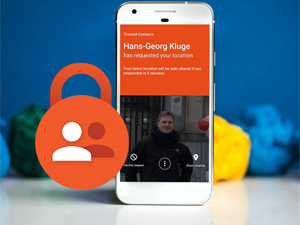



Date:06/12/16
 Google has launched a "personal safety app" for Android called "Trusted Contacts." The new app offers another location-sharing service from the company, one that Google envisions for use in emergency situations.
Google has launched a "personal safety app" for Android called "Trusted Contacts." The new app offers another location-sharing service from the company, one that Google envisions for use in emergency situations.
After installing the app, you can flag some of your contacts as "trusted." Then you'll be able to send your location to a trusted contact or ask for their location. The whole app is built around the "emergency" use case, complete with a dead man's switch for location requests. When someone asks for your location, you'll get a full screen pop up allowing you to approve or deny the request. You only have five minutes to do this, though—after five minutes, your location will be shared automatically. The idea is that if you're unable to use your phone, your trusted contacts will still be able to find you.
For Google, a lot of this functionality already existed in Google Latitude, a contact location app that has been built into Google Maps for several years. After the all-consuming Google+ came out, Latitude was killed in favor of a location solution baked into the social network called "Google+ Location Sharing." Now with Google+ being deemphasized across the company, it makes sense to put location back into a standalone app.
This new app isn't quite a replacement for Google+ Location, though, since there's no "always-on" location sharing mode. You can only see someone's location when they share it with you, with a maximum of 24 hours per location-sharing session. Google says the app is great for having someone "virtually walk you home if you feel unsafe," but it doesn't quite seem aimed at everyday logistics like "when will you be home for dinner?"
The app works using a Google Account, and using Trusted Contacts means you'll also have to have Google Location History turned on. If a phone is offline, this feature lets people see your "last known location" according to Google, but, like with Google Maps, it also means you're sending your location data to Google all the time.
The Android app is up on the Play Store right now. We asked about an iOS version and were told there are "no details to share at this point."
Google’s new “Trusted Contacts” app lets you keep tabs on family
 Google has launched a "personal safety app" for Android called "Trusted Contacts." The new app offers another location-sharing service from the company, one that Google envisions for use in emergency situations.
Google has launched a "personal safety app" for Android called "Trusted Contacts." The new app offers another location-sharing service from the company, one that Google envisions for use in emergency situations.After installing the app, you can flag some of your contacts as "trusted." Then you'll be able to send your location to a trusted contact or ask for their location. The whole app is built around the "emergency" use case, complete with a dead man's switch for location requests. When someone asks for your location, you'll get a full screen pop up allowing you to approve or deny the request. You only have five minutes to do this, though—after five minutes, your location will be shared automatically. The idea is that if you're unable to use your phone, your trusted contacts will still be able to find you.
For Google, a lot of this functionality already existed in Google Latitude, a contact location app that has been built into Google Maps for several years. After the all-consuming Google+ came out, Latitude was killed in favor of a location solution baked into the social network called "Google+ Location Sharing." Now with Google+ being deemphasized across the company, it makes sense to put location back into a standalone app.
This new app isn't quite a replacement for Google+ Location, though, since there's no "always-on" location sharing mode. You can only see someone's location when they share it with you, with a maximum of 24 hours per location-sharing session. Google says the app is great for having someone "virtually walk you home if you feel unsafe," but it doesn't quite seem aimed at everyday logistics like "when will you be home for dinner?"
The app works using a Google Account, and using Trusted Contacts means you'll also have to have Google Location History turned on. If a phone is offline, this feature lets people see your "last known location" according to Google, but, like with Google Maps, it also means you're sending your location data to Google all the time.
The Android app is up on the Play Store right now. We asked about an iOS version and were told there are "no details to share at this point."
Views: 490
©ictnews.az. All rights reserved.Similar news
- Azerbaijani project to monitor disease via mobile phones
- Innovative educational system to be improved under presidential decree
- NTRC prolongs license of two TV and radio organizations for 6 years
- Azerbaijan establishes e-registry for medicines
- Azerbaijani museum introduces e-guide
- Nar Mobile opens “Nar Dunyasi” sales and service center in Siyazan city
- International conference on custom electronic services held in Baku
- OIC secretary general to attend COMSTECH meeting in Baku
- Azerbaijan develops earthquake warning system
- New law to regulate transition to digital broadcasting in Azerbaijan
- Azerbaijani State Social Protection Fund introduces electronic digital signature
- Intellectual traffic management system in Baku to be commissioned in December
- Tax Ministry of Azerbaijan started receiving video-addresses
- World Bank recommends Azerbaijan to speed up e-service introduction in real estate
- Azerbaijan to shift to electronic registration of real estate





















